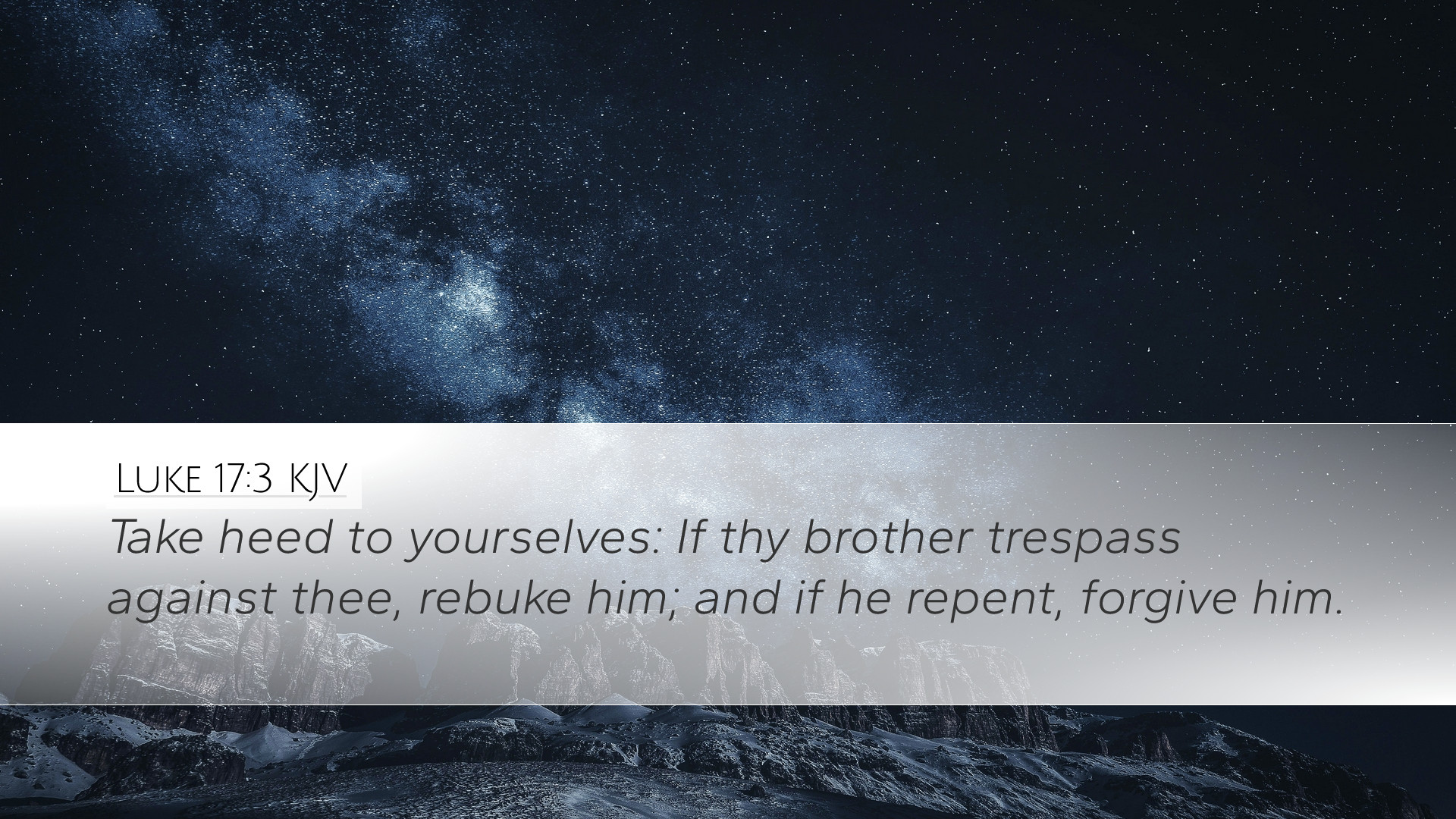Commentary on Luke 17:3
Verse: "Take heed to yourselves: If thy brother trespass against thee, rebuke him; and if he repent, forgive him."
Introduction
This verse from the Gospel of Luke speaks to the critical themes of accountability, rebuke, repentance, and forgiveness within the Christian community. Understanding this passage requires a multifaceted approach, emphasizing the importance of moral vigilance among believers as well as the relational dynamics of confrontation and reconciliation.
Exegesis of the Verse
The phrase "Take heed to yourselves" serves as a cautionary exhortation. It suggests a self-reflective posture that believers must maintain when engaging with others. According to Matthew Henry, this charge underscores the necessity for self-examination before administering any form of correction to others.
Henry further elaborates that the very act of rebuking involves a degree of moral and spiritual responsibility; hence, one must ensure their own integrity and readiness to assist their brother in his faults. Albert Barnes echoes this sentiment, emphasizing that it is easy to be consumed with the failings of others while neglecting to attend to one’s own spiritual condition.
Understanding 'Trespass' and 'Rebuke'
The word "trespass" refers to an offense or sin against another person, highlighting the relational aspect of such violations. Adam Clarke notes that the Greek term used here encompasses not only actions but also attitudes that may lead to harmful behaviors toward others.
When believers encounter a brother who has trespassed, they are commanded to "rebuke him." Foundational to this process is the understanding that rebuke must be loving and aimed at restoring rather than condemning. Clarke emphasizes that the goal of rebuke is rehabilitation, calling the offender to repentance.
Repentance as a Condition for Forgiveness
The latter part of the verse speaks to the results of sincere rebuke, stating: "if he repent, forgive him." Here, the interplay between repentance and forgiveness is critical. Barnes argues that fault and reparation cannot be hastily dismissed; true repentance must precede the grant of forgiveness.
Henry supplements this notion by stating that while forgiveness is an act of grace, it is also contingent upon the sincerity of the offender's remorse. This establishes a vital theological understanding that true forgiveness involves an acknowledgment of wrongdoing and a desire for restoration of the relationship.
The Implications for the Church
This passage has profound implications for the life of the church. The process of rebuke and forgiveness is not merely an individual act but reflects the communal responsibility borne by all members of the body of Christ. Clarke notes that the church is called to be both a beacon of truth and a refuge for the repentant.
A community that takes these teachings seriously fosters an environment where individuals feel safe to confront sin and seek restoration. Henry suggests that when done properly, this dynamic emboldens believers to cultivate genuine spiritual growth and mutual accountability.
- Accountability: Each believer must be vigilant, ready to address sin in love.
- Grace: The church must be a place where grace abounds, allowing for sincere repentance and forgiveness.
- Restoration: Emphasis on relationships should guide believers in their dealings with others, leading to healing rather than division.
Conclusion
Luke 17:3 challenges believers to uphold a standard of holiness that is both personal and communal. Pastors, students, theologians, and scholars must observe the delicate balance between holding one another accountable and extending grace. This passage, when understood through the lenses of the public domain commentaries, reveals the heart of Christ for reconciliation, urging believers to nurture a community marked by truth, love, and forgiveness.


